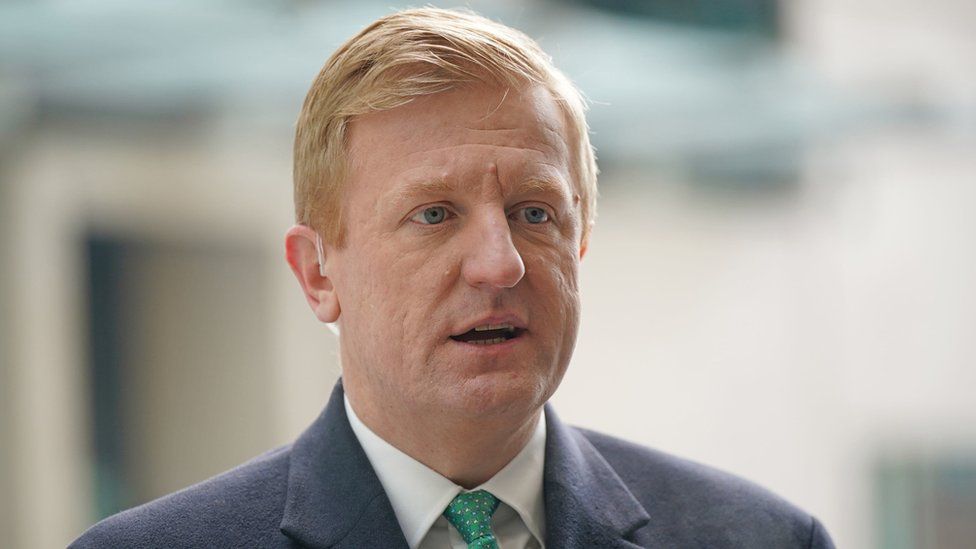ARTICLE AD BOX
 Image source, PA Media
Image source, PA Media
Deputy Prime Minister Oliver Dowden announced sanctions on two people and a China-affiliated over cyber-attacks.
By Sam Francis
Political reporter, BBC News
Two people and a company linked to the Chinese state have been sanctioned by the UK government over cyber-attacks.
Deputy PM Oliver Dowden said the group were behind "malign" attempts to access details of MPs and peers who had been critical of Beijing.
He claimed a group linked to the Chinese state "highly likely" conducted a further cyber-attack, accessing personal data of millions of voters.
He told MPs it had not compromised the security of elections.
"The UK will not tolerate malicious cyber activity," Mr Dowden said.
"It is an absolute priority for the UK government to protect our democratic system and values.
"We will continue to call out this activity, holding the Chinese government accountable for its actions."
The sanctions will freeze assets, barring UK citizens and businesses from handling the company's and individuals' funds or resources.
A travel ban will also prevent them from entering or remaining in the UK.
On Monday, Prime Minister Rishi Sunak called China "the greatest state-based challenge to our national security".
Mr Sunak said: "China represents an economic threat to our security and an epoch-defining challenge.
"So it is right we take steps to protect ourselves."
Mr Dowden credited the Defending Democracy taskforce, a committee that tracks election threats, with pinpointing China-affiliated organisations and individuals behind cyber operations.
'Watershed moment'
Former Conservative leader Sir Iain Duncan Smith, former minister Tim Loughton and the SNP's Stewart McDonald all faced harassment, failed hacks and impersonations by groups seeking to influence foreign dignitaries.
They are members of the Inter-Parliamentary Alliance on China which scrutinises, and often criticises, the activities of Beijing.
Speaking after a briefing from Parliament's director of security, Sir Iain said the sanctions should mark "a watershed moment whether the UK takes a stand for human rights and an international rules-based system".
China should be placed in the "enhanced tier" of the new foreign influence registration scheme, which would increase scrutiny on Chinese government backed operations in the UK.
Sir Iain said: "The West has to wake up to the fact this is a challenge to the very way that we live our lives.
"To our belief in democracy, human rights, freedom of expression, freedom of worship. These are the things that we hold dear, but we seem reluctant to want to defend those against the others who hold none of those virtues and values and want to take ours from us."
Sir Iain and Mr Loughton were among among nine UK citizens sanctioned by China over exposing human rights abuses against the Uighur Muslim minority group.
Mr Loughton warned China is "in the business of trying to influence elections and democracies as well".
China is 'greatest threat to UK's economic security' - Sunak
Sanctioning groups linked to China, a fellow member of the UN Security Council, is an escalation in the diplomatic tension between the two countries.
This marks a major change from just a few years ago, when British leaders aimed to usher in a "Golden Age" with China.
The prime minister then was David Cameron, who is now the foreign secretary.
Lord Cameron said: "It is completely unacceptable that China state-affiliated organisations and individuals have targeted our democratic institutions and political processes.
"We will always defend ourselves from those who seek to threaten the freedoms that underpin our values and democracy."
UK government concern over Chinese espionage and parliamentary interference has been rising.
Acknowledging the attacks last August, the Electoral Commission said "hostile actors" had gained access to copies of the electoral registers and broken into its emails and "control systems", but added that it had neither had any impact on any elections nor anyone's registration status.
The commission said last August that they weren't able to predict exactly how many people could be affected, but that the register for each year contained the details of around 40 million people.
The Electoral Commission has since taken steps to secure its systems against future activity.
In September 2023, a parliamentary researcher was arrested under the Official Secrets Act accused of spying for China.
And a year before, an unusual parliamentary interference alert was issued regarding the activities of UK-based lawyer Christine Lee.
China has consistently denied accusations of espionage and wrong-doing.
China's foreign ministry spokesperson Lin Jian said the government cracked down and punished all types of malicious cyber activities.
He called on all parties to "stop spreading false information and take a responsible attitude to jointly maintain peace and security in cyberspace".
The government stresses it has rejected or wound down Chinese investment in infrastructure in recent years on national security grounds.

 1 year ago
69
1 year ago
69








 English (US) ·
English (US) ·